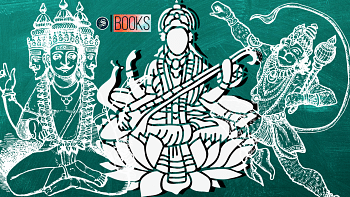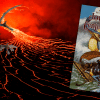Prabir Ghosh taught me to be a sceptic

Growing up in a household where the habit of reading books was instilled into me from a young age, I would often rifle through my "Chittagong-er Dadu's" books which my mother had inherited from her father. I called him with the unique name to distinguish him from my paternal grandfather who lived in Dhaka, while my mother's father lived in Chittagong. It was from his collection that I came across the first book of the Aloukik Noy, Loukik series (1990-2003) by Bengali author Prabir Ghosh.
For 12-year-old me, who was a very superstitious and religious child, the cover with the black cat was a dark and ominous sign. Yet, my mother's quick attempts to sweep the book away from my hands—because I was not old enough to read it—sparked my curiosity to read it even more.
I found myself smuggling the book under my quilt and reading it through chilly winter nights. What started off as a childish attempt to spite my mother's control over my reading habits turned out to be one of the most monumental reading experiences I had till that date.
As suggested by the name, Ghosh's book attempts to debunk the various claims of supernatural powers which are found across the Indian subcontinent. What made his book much more compelling to me was the cultural and geographical proximity of the events being described, as well as the simplicity of his use of language. The books I had previously read on similar topics discussed such events in a foreign setting. Ghosh's book felt closer to home; I could relate to the cultural context being described.
The supernatural incidents which he discusses in the book did not seem alien or different from what we often hear about in our society—from djinns claiming sweets to evil spirits possessing people. In fact, I can recall how someone in my distant family was "diagnosed" as being possessed by an evil spirit and I soon realised that the individual in question simply had psychological disorders—something that I had learnt to recognise from Prabir Ghosh's book.
Through his simple and coherent scientific explanations for "supernatural" events such as the practice of witchcraft or the sanctity of religious sites, he challenged the dogmatic belief system which exists throughout much of South Asia. Writing about the famous idol at India's Somnath Temple which was known to miraculously levitate in the past, he explained how the idol was made out of iron; it was suspended only due to the presence of magnetic ingots which were carefully placed. This was revealed when Mahmud of Ghazni, founder of the Ghaznavid dynasty, removed the magnetic ingots of the temple during his invasion of the region.
For a child who had grown up in a household where he was indoctrinated with a plethora of religious and superstitious beliefs, Ghosh's straightforward manner of getting to scientific rationale was nothing less than revolutionary to me. His book stood out from my other reads, mostly works of fiction such as the Hardy Boys or Nancy Drew. And so I felt a rush of adrenaline everytime I read his more scientific explanations for supernatural events—events which I knew had actually happened, unlike those in genre fiction.
Ghosh's writing taught me not to jump the bandwagon when it comes to supporting supernatural claims and to thoroughly assess those who make such claims. "To break down people's superstitious beliefs and to take the fight against pseudoscience forward, it is necessary to investigate such claims and find out the truth. I have done this in the past and will continue to do so", he wrote. It was a stepping stone which made me evaluate much of my own superstitious and religious beliefs—which I later abandoned upon further judgement.
Ghosh's work spanned decades, from thoroughly investigating supernatural practices to radically challenging the claimants who demonstrate such powers in public for a price of five million rupees. His work as the founder of the Bharatiya Bigyan O Yuktibadi Samiti (Science and Rationalists' Association of India) often saw him at the centre of public controversies, especially when he questioned the divinity of revered personalities like Nobel Laureate Mother Teresa and godman Balak Brahmachari.
But, for an entire generation, his legacy is cemented in the value of scepticism in a world where too many people will be quick to claim access to other-wordly abilities.
Hrishik Roy is an intern at Daily Star Books and a contributor at SHOUT. Reach out to him at [email protected].

 For all latest news, follow The Daily Star's Google News channel.
For all latest news, follow The Daily Star's Google News channel. 








Comments